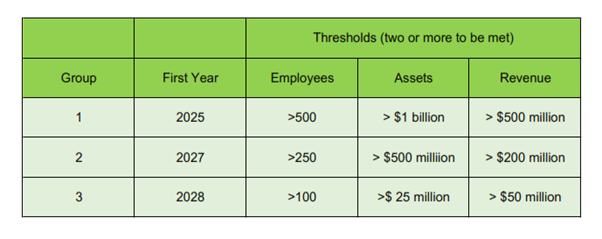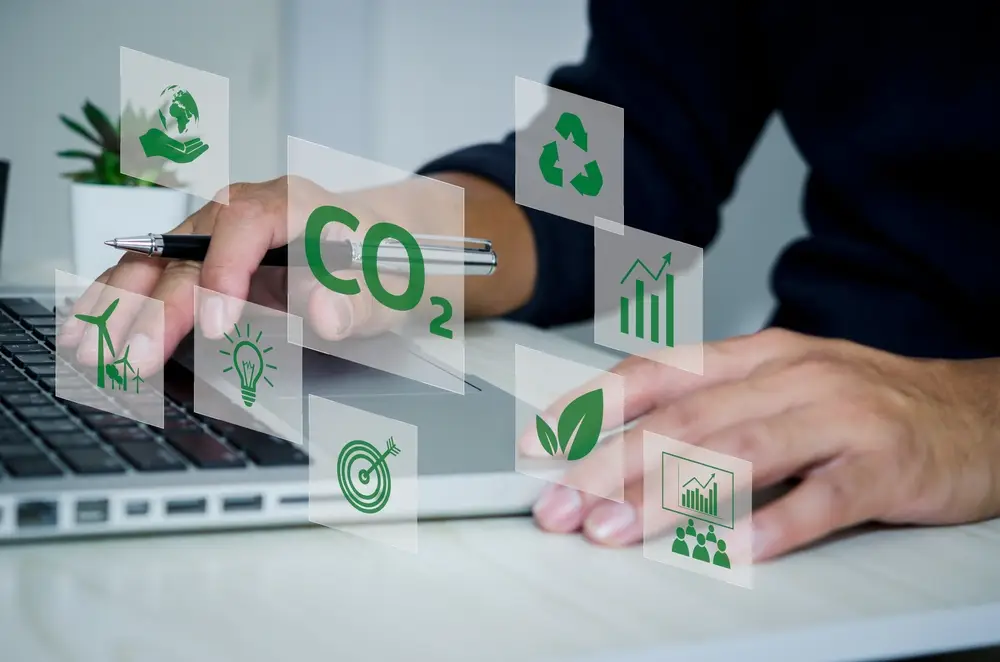Many Small and Medium Sized Businesses are being requested to report on their Carbon Accounting Emissions for their group of companies.
What is Carbon Accounting for my Group?
Carbon accounting involves calculating and accounting for a business’s greenhouse gas (GHG) emissions to assess its carbon footprint within defined emissions boundaries. This process includes measuring emissions across three categories: scope 1, scope 2, and scope 3.
Scope 1 emissions are directly produced from a company or organization’s activities. Examples include emissions from fuels used in manufacturing products. Notably, some service-oriented businesses may not generate any scope 1 emissions.
Scope 2 emissions are indirect emissions associated with purchased electricity and heating utilised in company facilities.
Scope 3 emissions encompass all emissions within the supply chain. This broad category includes emissions from waste, packaging, services provided by suppliers, employee commuting, remote work, and product deliveries. A thorough and accurate carbon accounting practice requires including and assessing all three emission scopes.
Why am I being asked to do Carbon Accounting?
The need for family business groups to do Carbon Accounting in Perth comes from new legislation. In particular, the release of the following carbon accounting standards from the Australian Accounting Standards Board:
- ASRS 1 General Requirements for Disclosure of Climate-related Financial Information, which is based on IFRS Sustainability Disclosure Standard S1 General Requirements for Disclosure of Sustainability-related Financial Information;
- ASRS 2 Climate-Related Financial Disclosures, which is based on IFRS S2 Climate-related Disclosures; and
- ASRS 101 References in Australian Sustainability Reporting Standards, a draft service Standard to list the relevant versions of any non-legislative documents published in Australia and foreign documents that are referenced in ASRS Standards.
And while Perth SMEs won’t directly report (yet) on Carbon Accounting for their Group, they are part of the supply chain for larger corporates that will do Carbon Accounting for their group of companies. And the Carbon Accounting requirements for their group will require a review of their supply chain. So many Perth SME’s are now being asked by their customers to undertake Carbon Accounting for their family group.
When is Carbon Accounting a reality for Perth SME’s?
The ultimate position is that carbon accounting will be managed within the business accounting and financial reporting framework. There is a staged approach to the introduction of carbon accounting. With large businesses (those with a turnover of over $500m) needing to directly track and account for their carbon from July 2024. This staged approach will then require many SME’s to do directly report on Carbon Accounting in their financial statements from July 2027.
The following diagram explains the tests and timing of SME’s and when Carbon Accounting will be a reality for them.
There is a staged approach to the introduction of carbon accounting. With large businesses (those with a turnover of over $500m) needing to directly track and account for their carbon from July 2024. This staged approach will then require many Perth accountants and their clients to track and record their carbon emissions soon.
Ultimately if your company is a large reporting entity in 2028 you will need to undertake carbon accounting within your financial reports.

Why do I need to understand Scope 3 Emissions?
Understanding climate-related financial disclosures requires focusing on how companies handle their Scope 3 emissions, a key yet often underestimated part of their carbon footprint. These emissions, while controversial, are crucial for a comprehensive view of a business’s environmental impact. A company’s carbon footprint is categorized into three areas:
- Scope 1 (emissions directly controlled by the business, like company vehicles),
- Scope 2 (emissions from sources like utilities, which a business has limited control over), and
- Scope 3 (all other emissions in the value or supply chain). Scope 3 emissions, according to the GHG Protocol, constitute over 70% of a business’s total emissions.
This is particularly significant for large companies with many small and medium-sized suppliers. The debate around Scope 3 centres on a pertinent question: “Why should the reporting company bear the responsibility for Scope 3 emissions when these are essentially the Scope 1 emissions of their suppliers?”
What is Scope 3 Emissions?
Scope 3 emissions encompass the indirect greenhouse gases emitted due to a company’s activities but fall outside its direct operational control. It is an essential part of Carbon Accounting for Perth SME’s. These emissions span the entire value chain, including raw material extraction, production, transportation, product usage, and disposal. In contrast to Scope 1 (direct emissions) and Scope 2 (indirect emissions from energy consumption), Scope 3 emissions often form the most significant portion of a company’s carbon footprint.
While measuring a company’s total carbon footprint can be complex and data-heavy, starting this process is more accessible than it might seem – especially with cloud accounting software backed up by a Perth Carbon Accountant.
Small and medium-sized enterprises (SMEs) across Perth face particular challenges in tracking their Scope 3 emissions as part of their Carbon Accounting reports, primarily due to these emissions outside their immediate control. Accurate measurement requires collaboration with suppliers and distributors, which demands strong communication and established relationships.
Using cloud accounting software through the support of your Perth carbon accountant will help Perth SME’s identify, measure, track, quantify, account and report for their carbon emissions. More importantly, the carbon accounting reports will be documented and capable of customer review and audit.
The difficulty in measuring Scope 3 emissions varies between industries.
Product-based companies, especially those in wholesale retail or manufacturing dealing with a broad spectrum from raw materials to finished products, often find it more challenging to track these emissions. Service-based companies, typically deal with fewer suppliers for office supplies, technology solutions, and financial services, making the process simpler.
What are the Mechanics of Scope 3 Emissions?
To grasp the concept of Scope 3 emissions, let’s take the example of a clothing manufacturer. This manufacturer can directly monitor and manage emissions from its factories (Scope 1) and keep track of the energy it uses (Scope 2). However, the broader environmental impact of its products extends far beyond these areas. In the case of Scope 3 emissions, these would include the carbon emissions generated in growing and exporting cotton (used as a raw material), the emissions from manufacturing and transporting the clothing, and even the emissions associated with consumers washing and maintaining the garments. Further, the emissions related to the eventual disposal or recycling of these clothes are also part of the manufacturer’s Scope 3 emissions.
The Importance of Managing Scope 3 Emissions for Businesses
Comprehensive Environmental Understanding: Businesses that acknowledge and manage Scope 3 emissions understand entirely their environmental impact. This holistic perspective is crucial for crafting effective sustainability strategies and setting impactful reduction goals.
Supply Chain Synergy: Focusing on Scope 3 emissions motivates businesses to work closely with their suppliers. Such collaboration fosters sustainable practices throughout the supply chain, benefitting each process stage.
Brand Image Enhancement: In a world where consumers are increasingly aware of their ecological footprint, companies that actively manage and minimise their Scope 3 emissions showcase their commitment to sustainability. This effort strengthens their brand image and appeals to eco-conscious consumers.
Regulatory Preparedness: As global efforts to tackle climate change intensify, governments and regulatory authorities are implementing stricter measures. Proactively addressing Scope 3 emissions positions businesses ahead in regulatory compliance, reducing future compliance difficulties.
Risk Management: Understanding and mitigating Scope 3 emissions allows businesses to identify and address vulnerabilities in their supply chain. This insight is key to enhancing resilience, reducing risks, and ensuring the stability and longevity of their operations.
Approaches to Managing Scope 3 Emissions in Business Operations
Engaging the Supply Chain: Companies can collaborate with their suppliers to implement sustainable practices, reduce emissions, and make resource use more efficient.
Transportation Efficiency: By streamlining transportation and distribution methods, businesses can significantly lower the emissions linked to the movement of their products.
Circular Product Design: Creating products that are long-lasting, easy to repair, and recyclable helps to decrease emissions that occur during disposal.
Educating Consumers: Informing customers about responsible usage, upkeep, and disposal of products can reduce emissions throughout the product’s life cycle.
Setting Emission Reduction Goals: Establishing targets based on scientific data underscores a company’s dedication to sustainability and provides a structured approach for acting.
The supply chain role is the primary impact Perth SME’s have with Carbon Accounting. Many groups are being asked by larger corporates to report on their carbon emissions and this is driving the need for Carbon Accounting across Perth.
The role of Scope 3 emissions is critical in the realm of corporate sustainability. As companies adapt to an ever-evolving global landscape, grasping and managing these indirect emissions is key to generating a beneficial environmental impact and securing enduring success. In embracing the task of overseeing Scope 3 emissions, businesses not only aid in fostering a healthier planet but also lead the way towards a more robust and sustainable future.
Top of Form
How to Simplify Carbon Accounting
The prospect of Carbon accounting on a yearly basis and integrating that into your financial reports can be a daunting task. However with cloud accounting packages that integrate into your accounting software and ERP the tracking, measurement, recording, reporting and documentation of your carbon emissions should not be as significant as you might think.
At Westcourt we have trialled and are still trialling many cloud accounting packages with a solution to our Perth SME’s coming in January 2024.
Getting Westcourt to help with Carbon Accounting
Many Perth SME’s are quickly turning their heads to Carbon Accounting for the family business group. And at Westcourt, we are ahead of the game in simplifying the carbon accounting process with our dedicated team of carbon accountants focused on using top-tier cloud accounting software to identify, track, measure, record, and report on your Carbon Emissions to your customers. Given our status as a Xero Platinum Partner, our commitment to Carbon Accounting and our specialist focus only on families in business, we are the natural choice for integrating your carbon accounting obligations into your current cloud accounting and ERP software – so why not give us a call?

